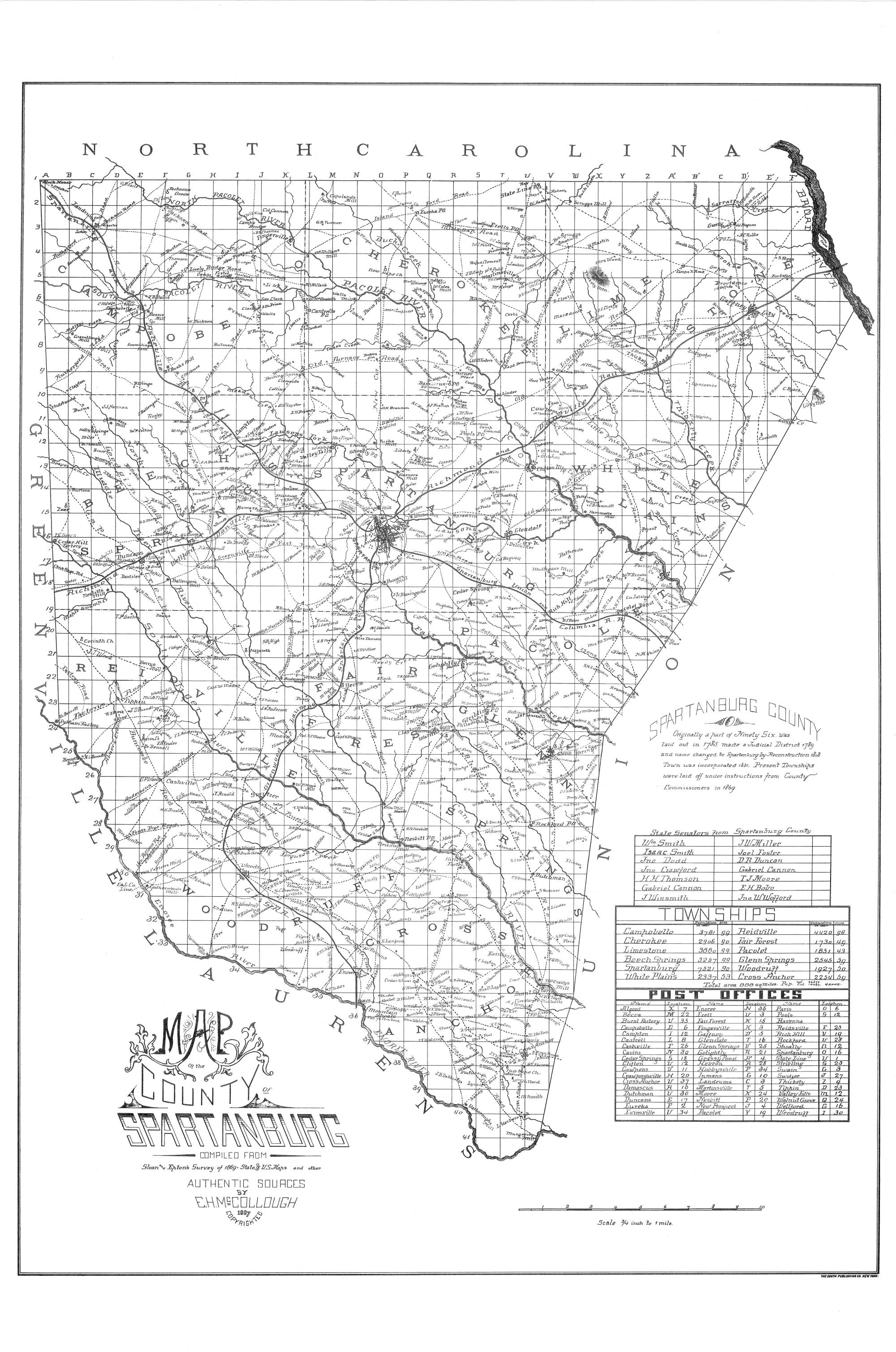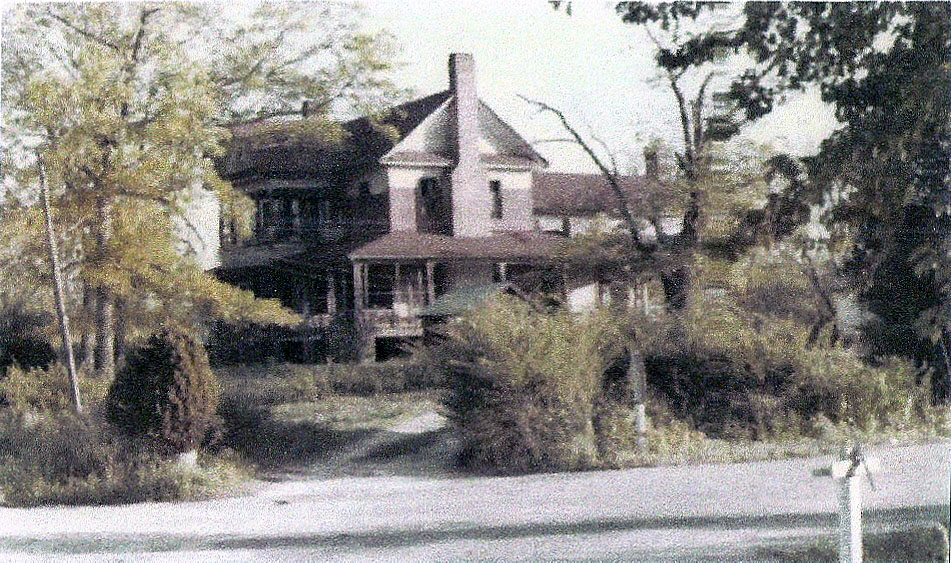
UPDATED 07 MARCH 2016:
Thomas Miles (1739 -1837) was born in Baltimore County, Maryland as the only child of Isaac Miles (1723-1754) and Ann Preston (1725-1758). He is first found in the Old Ninety-Six/Spartanburg District in 1767 when he married Sarah Farrow. Thomas is mentioned in Spartanburg District deed abstracts beginning in 1786. His land was located on the Tyger River about three miles above Blackstock's Ford, just off present day Burnt Factory Road near Cross Anchor. Thomas fought with the militia at the Battle of Cowpens in the Revolutionary War, 17 Jan 1781, serving in Colonel Roebuck's Regiment, under his brother-in-law, Thomas Farrow. He also served under Captain John Ford, in the 1st Spartan Regiment. In March and August of 1833 Thomas Miles gives sworn affidavits for Thomas Farrow’s Revolutionary War Pension application. We know from a biography of their great grandson Willis F. Miles (1831-1900), published in A Reminiscent History of the Ozarks Region (1894) that the Miles home was used as a hospital after the Battle of Blackstock's or possibly the Battle of Musgrove's Mill. “He [Isaac C. Miles] was but a small boy during the Revolutionary War and his father, Thomas Miles, was a soldier in the same. The latter’s house was used as a hospital for some time, as there was a battle fought nearby.” Willis F. Miles’ grandfather, Isaac Miles (1776-1846) was one of 12 children born to Thomas and Sarah. Isaac Miles gives a sworn affidavit in Jan 1846 on behalf of his uncle Landon Farrow’s Revolutionary War service. Sons Major William H. Miles (1786-1870) and Capt. Landon Miles (1782-1858) also submit sworn affidavits on behalf of their uncle Landon Farrow. Landon Miles documented his father’s death in the records of New Hope Baptist Church, Cross Anchor, South Carolina: "9th Oct, 1837 Thos Miles departed this life in the 97th or 98th year of his age." Thomas and Sarah Miles are thought to be buried in the Miles Family Cemetery near Cross Anchor however no identifying headstones have been found.
Sarah Farrow (1750-1823), born in Prince William County, Virginia, was the first child of John Thomas Farrow (1727 – 1776) and Rosanna Waters (1734-1782). John Thomas Farrow died of smallpox in North Carolina while traveling back home to South Carolina. Rosanna Waters Farrow is legendary and the embellished story below is contested by DAR. Some feel this story alone is the reason Rosanna's DAR Patriot status was closed. However, other stories of Rosanna's bravery endure including Mary Stewart Owen Dean's (1822-1886) account of her husband, Hosea Jefferson Dean's (1806-1855) great-grandmother's brillant ride to save her sons! Whether the story is true or not, one thing is clear; Rosanna was highly loved, respected and cared for by her children and grandchildren. Rosanna has many, many descendants named in her honor. Sarah’s brothers, Thomas (1752-1841), John (1757-1843), Landon (1759-1799) and Samuel (1762-1824) all fought in the Revolutionary War and became known collectively as The Farrow Boys. Samuel Farrow went on to become South Carolina’s Lt. Governor in 1810 and was later elected to Congress from the Pinckney District. An entry in the Draper Manuscripts: Thomas Sumter Papers p. 316 describes the Farrow Brothers: “Thomas, John, Samuel and Landon Farrow, bachelor brothers, lived on the Cedar Shoal, 4 miles above [Musgrove’s] Mill & between Musgrove’s & Heads Ford who were from Virginia & nephews of Col. Philemon Waters: No more staunch Whigs or brave men drew a sword for that good cause than these brothers. Rosa was their mother’s name. The Farrows were at King’s Mountain. Landon & Thomas were much known by their wounds in the war.” Sarah’s youngest sibling, William (1771-1852) was too young to join the Patriot forces. Sarah also had two sisters; Mary (1762-1843) who married John J. Clayton and is buried in the New Hope Baptist Church cemetery near the last daughter of John and Rosanna Waters Farrow, Jane Farrow Bobo (1768-1828). Jane’s husband the Rev. Spencer Bobo (1767-1816) established New Hope Baptist Church on 05 Feb 1804. The Miles family were among the original members of New Hope. In his will dated 19 Feb 1816, Rev. Bobo appoints Landon Miles as manager of New Hope Baptist Church. Landon Miles served as deacon of New Hope church until his death in 1858. All the Farrow siblings with the exception of William who died in Mississippi are buried in the Spartanburg/Laurens area.
Landon and Sarah Martin Miles’ (1781-1848) second son, Daniel Martin Miles (1806-1886) and Nancy Stroud (1813-1871) had 9 children. Two of their sons, M. D. Miles (1854-1916) and Charles Pinckney Miles (1846-1920) became local physicians. M. D. or McDuff Miles never practiced medicine; however his brother, Dr. C. P. Miles served as a doctor during the Civil War. Daughters Hannah (1849-1925) and Sallie (1851-1926) were school teachers in the Hobbysville area. Another son, Daniel M. Miles (1852-1927) was a Spartanburg County Supervisor for 10 years. His obituary states Daniel M. Miles served Spartanburg County as a member of the general assembly. While serving this term he was appointed chairman of the state dispensary board. Daniel and Nancy Stroud Miles along with their descendants are buried in a small fenced and gated plot within Cedar Shoals Baptist Church Cemetery, Enoree, South Carolina. Daniel’s home before it burned is shown in the photo above. His property near Enoree is listed as D. Miles on the 1869 Spartanburg County map (see below). Today, his old home site remains a vacant lot.
Another Miles descendant very well connected to the Spartanburg community was Charles Oscar Hearon (1876-1959). His mother Cleo P. Miles (1851-1890) is the great great granddaughter of Thomas and Sarah. Cleo’s husband and Charles’ father was Rev. Daniel Scott Hearon (1849-1933), President of Martha Washington College in Abingdon, Virginia. Announcing Charles O. Hearon being named to the Journalism Hall of Fame, The Spartanburg Herald writes, “Mr. Hearon was editor of The Herald between 1906 and 1932. He left the newspaper in 1932 when he entered the field of radio. He returned to The Herald as editor in 1948 and remained in that position until his death in 1959.”
Thomas and Sarah had 3 grandsons who became ministers.
Rev. George Washington Miles is the great-grandson of Thomas and Sarah. He was born 27 Jan 1829 in Cross Anchor to James Aquilla Miles (1802-1880), Landon and Sarah's oldest child, and his wife Priscilla Wells (1807-1901). According to Holston Methodism, Vol. V pp. 461-463, “He intended to study for the law, but after a struggle he yielded to the motions of the Holy Spirit and consented to become an itinerant minister.” He was admitted to the Holston Methodist Conference in 1855. Father Miles was considered one of the pioneers of Methodism in Southwest Virginia and East Tennessee. Rev. George W. Miles died 16 Sep 1892 and is buried at Round Hill Cemetery, Marion, Smyth County, Virginia.
One of the early pastors of Cedar Shoals Baptist Church in present day Enoree was their grandson Rev. Miles Rainwater. Miles was born in 30 Oct 1787 in Cross Anchor to Nancy Ann Miles (1774-1855) and James Rainwater (1768-1828). Rev. Bobo's will of 1816 appoints Miles Rainwater as manager of Cedar Shoals. The History of Cedar Shoals Baptist Church: "On May 24, 1817, Miles Rainwater, a young member of the church, was ordained as a minister and became pastor. He was greatly admired and successful, though he had limited educational opportunities. He farmed while he was pastor in order to make a living." Rev. Rainwater died unexpectedly 05 Jul 1826 at age 38, leaving nine children. He is buried in Cedar Shoals Baptist Church cemetery.
UPDATED 07 MARCH 2016 regarding Rev. Wiley M. Miles:
Another grandson of Thomas and Sarah who became a minister is Rev. Wiley M. Miles. A new discovery has proven an error first published in Bobo Cousins by the Dozens in 1968, Fayette, Alabama with only a small print run of 150 copies. Page 123 clearly states Wiley M. Miles, born in Spartanburg District 01 May 1811 was the son of Landon Miles and Sarah (Martin) Miles. This “fact” has circulated through all forms of genealogy research since. This idea that Wiley was Landon’s son may have begun as far back as 1924 when Mrs. A. J. Lamb of Enoree replies to a letter written by Wiley’s son Landon Miles (1845-1930) of Fayette, Alabama. Naturally he assumes he’s named in honor of a grandfather, i.e. Landon Miles of Cross Anchor. However, no paper documentation has surfaced linking Wiley Miles to Landon Miles and Sarah Martin. In fact, all documentation on Landon and Sarah suggest Wiley cannot be their son! The Estate/Probate papers of Landon’s sister Mary Miles (1790-1855) (Spartanburg County Estate File #2476) Item #7 leaves an inheritance to her brother, Isaac’s son William as well as other nephews and nieces. Another brother of Mary’s, William H. Miles (1791-1876) and his son Thomas P. Miles (1819-1856), executors of her will, identify in the Citation and Evidence to Prove Will dated 16 Sep 1856 “William Miles” as one of the many “heirs at large.” They go on to list the “heirs that reside outside the limits of the state”. Here the names “William Miles” and “Wiley Miles” are listed along with Preston and Hosea Miles. Hosea, Willis F Miles' father, moved to Franklin county, TN in 1830. Preston and Wiley were in Fayette county, Alabama by 1855 when Mary dies. (Please see the Wiley Miles Photo Album for a copy of this document.) This is the only primary source document to emerge linking Wiley Miles to any of the other know Miles in Cross Anchor, South Carolina. Based on Mary Miles’ will and other circumstantial evidence to long to include here; Wiley M. Miles AKA William Miles is the son of Isaac Miles and Mary Tinsley.
Exact date of death for Isaac Miles and Mary Tinsley is unknown but Isaac died between the time Mary Miles’ will was written and the time she died in July of 1855. We lose track of Mary Tinsley Miles after the Union County, SC 1840 census. Mary Tinsley’s parentage is uncertain. We do know Golding Tinsley owned land adjacent to Thomas Miles and later Landon Miles. Several Tinsleys are recorded in Spartanburg and Union county census records during this time period.
Brothers [Isaac] Preston Miles (1814-1880) and Rev. William/Wiley Miles married Bobo girls. Preston married Martha Bobo (1821-1880), daughter of Lewis Bobo (1804-1892). Wiley married Lewis Bobo’s sister Rebecca Savannah Bobo (1813-1859). These siblings are the children of Tillman Bobo (1766-1844) and Beulah Yarbrough (1781-1840) of Union County, SC, making them second cousins of Rev. Spencer Bobo. The Miles, Bobo, Rainwater and Edwards extended families move as a group to Fayette County, Alabama between 1845 -1847. Another sibling of Rebecca and Lewis to make the journey to Fayette county was Charlotte Temple Bobo (1810-1876) along with her husband George Edwards (1805-1876) and their children. Mt. Vernon Methodist Church was organized in 1850 with Wiley donating the land for the church, school and cemetery. He also served as the first pastor. The Christian Advocate 26 Jun 1880: “[Rev. Wiley Miles] joined Methodist church in 1836; licensed to preach in Methodist Church April 1866; preached until his health failed.” Rev. Wiley M. Miles died in Fayette County, Alabama 05 Nov 1879 and is buried at Mt. Vernon Methodist Church cemetery between Rebecca and his second wife, Mary E. Floyd Yancey Miles (1825-1891). Preston Miles’ family ultimately settled in Yell County, Arkansas where he and Martha reside until their deaths.
Included in this large family group from Spartanburg and Union counties migrating to Fayette county are daughters of Rev. Miles Rainwater and Nancy Edwards Rainwater (1788-1855) and their families. Sarah Sally Rainwater (1808-1881) and husband Levinston Bobo (1806-1883) as well as her sister Mary Polly Rainwater (1810-1857) who wed Starling Spencer Bobo (1808-1880) – both men brothers to Rebecca Bobo Miles, Lewis Bobo and Charlotte T. Bobo Edwards. Mother Nancy accompanies her daughters to Fayette County. All remain there the rest of their lives.
Now you can answer questions #4, #7 and #15 on the Quiz Page correctly!
(Updated March 2016)
Follow this link for more history and information about Cross Anchor, South Carolina
http://www.examiner.com/article/cross-anchor-sc
http://en.wikipedia.org/wiki/Cross_Anchor,_South_Carolina
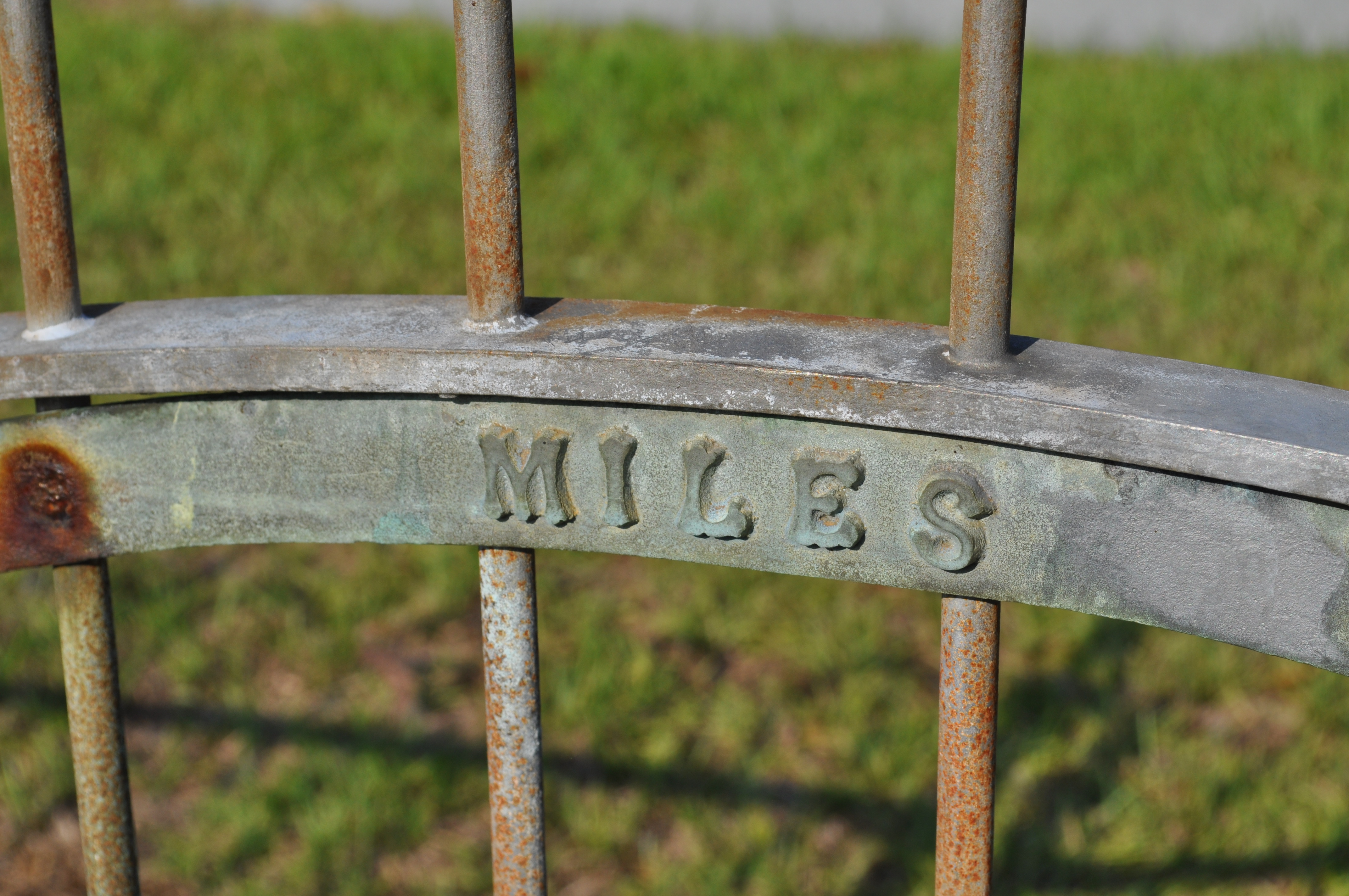
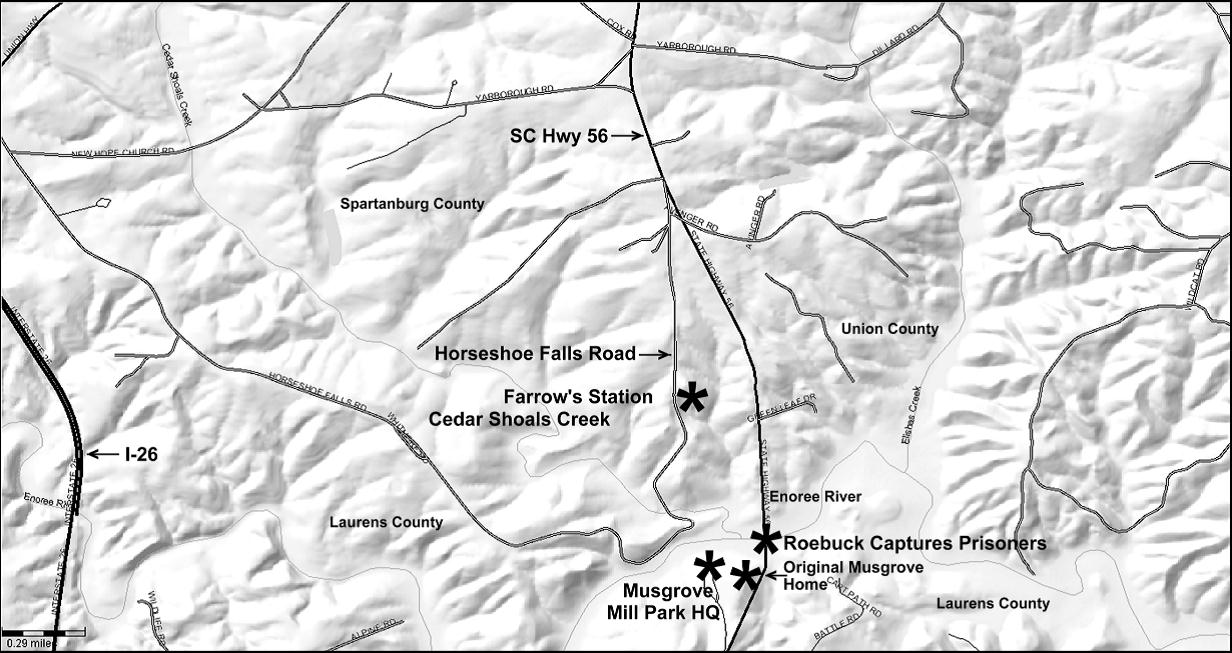
Farrow's Station:
GPS: 34.60420°N 81.85414°W
Directions: Farrow's Station is reached by going about 1.5 miles north on SC hiway 56 from the bridge over the river, then turn left on to Horseshoe Falls Road and go south about .85 mile. The site is about 80 yards to the left of the road.
One of the local Patriot militia outposts of the Spartan Regiment was Farrow's Station, which was the home of Landon Farrow, located on the north side of the Enoree River within sight of Musgrove Mill. William H. Miles, son of Thomas Miles and Sarah Farrow recounts this story told by his aunt, Rachel Walker Farrow, Landon's wife. Lt. Thomas Farrow and a small party of men were surprised at Farrow's Station at sundown by Tories who surrounded the house. The Patriots barricaded the doors and carried on a gun battle with the attackers until about midnight, killing at least one Tory. After an unsuccessful attempt to burn the house, a truce was made and the Loyalists finally agreed to leave on the condition that the fort's defenders would supply them with arms and ammunition. However, Lt. Farrow and the Tories got into an argument over whether a pistol should be handed out butt first or barrel first. Rached Farrow ended the argument by carrying the weapon out and delivered it . With this done, the Tories departed.
Note: An old house foundation has been found at this location. In addition, Revolutionary War items have been discovered around the foundation. It is within sight of the old home of the Musgrove's. The land drops in elevation from this site to the mill, which would make the mill visible from Farrow's Station. This site is in Spartanburg County.
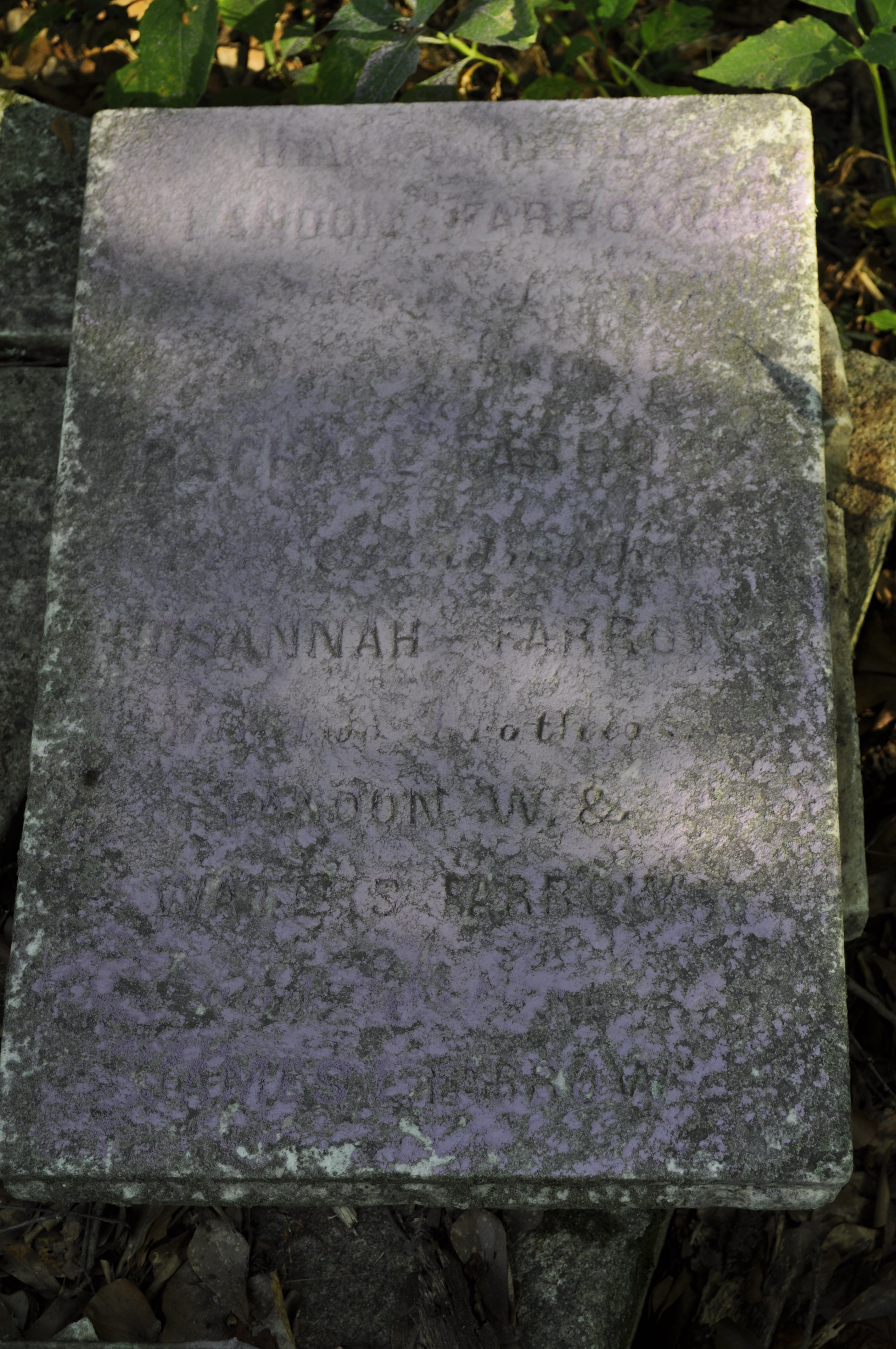
ROSANNAH WATERS FARROW.
Article printed in The American Monthly Magazine, 1901 which is a publication of D.A.R. by Mrs. Fred B. Gordon
Rosannah Waters Farrow was a descendant of Edward Waters, one of the oldest members of the Virginia Company. He was in the service of Lieutenant George Somers, went to Virginia with him, was a member of the council, and went to the West Indies for supplies. After his return he was made captain, burgess and justice. She was the daughter of Philemon and Sarah Bordroyne Waters and the sister of Colonel Philemon Waters, who was a close friend of George Washington and the one who fired the first shot at the battle of Fort Necessity - Washington's first regular conflict. Living quietly in her old colonial home at Winchester, Virginia, Rosannah grew to womanhood and ere long plighted her troth to one John Farrow, whose name she was destined to distinguish. Led by the spirit of emigration, John Farrow, with his wife and several children, left the fertile valleys of old Virginia and drifted southward to the hills of South Carolina, settling in the Ninety-sixth district, of which Spartanburg was then a part, on the banks of the Enoree, about five miles above Musgrove's Mill. Hardly had they arrived before Mr. Farrow was called on business to Virginia and while returning was stricken with small- pox and died. Left thus, the mother had the entire care of bringing tip in the paths of honor her eight children.
At this time, the southern colonists, aroused by the fearful struggle for independence and devotion to their country, were led to take up arms. Rosannah Farrow, a warm patriot herself, proudly gave her five sons, Samuel, John, Laudon [Landon], William and Thomas to fight for liberty, and although the oldest was not yet twenty-one years of age, he was put in command of a cavalry company and led the youngest, a mere lad. Thus the mother, whose lot had been cast heretofore among scenes of quiet, peace and prosperity, was left unprotected and surrounded by Tory neighbors, treacherous and cruel. Often they were forced to go without food and to hide themselves among the woods and swamps and the rocky coves of the Enoree. During the summer of 1780 her sons were in active service. The four older belonged to the company engaged in scouting and skirmishing. Fierce encounters took place and the prisoners were generally shot without mercy. It was one night during this memorable summer that Mrs. Farrow was aroused by a loud "Hallo" at her gate. Hastily dressing herself and securing a pistol, she appeared in the doorway. "A friend, my lady, with a message. Three of your sons have been captured in an encounter with the enemy and are confined in the jail at Ninety Six, the British post. It's an unlucky thing, but Colonel Cruger is anxious to secure the return' of some of his red-coats that Colonel Williams captured at Musgrove's Mill, and he sends word that he will give one rebel for two British soldiers, if the trade is made in a hurry. He wants to retreat from Ninety Six and will shoot or hang our boys when he does." Endowed with the same courage and valor as her famous brother, Colonel Philemon Waters, Rosannah Farrow proved herself a heroine ready to act. Giving directions to her poor, defenseless girls, she seized a rifle and going to the stable caught and saddled an unbroken black colt, the only horse left. With a prayer to kind Heaven to shield her daughters she galloped into the darkness. Towards Colonel Williams's camp, in a sequestered valley near the Fair Forrest river, lay Mrs. Farrow's course. Her path was through a lonely wilderness, inhabited only by a few hunters and scattered families of Indians. On she rode, in her excitement, her raven hair flowing to the winds, her black eyes flashing, and leaving undecided those whom she passed as to whether she was woman or phantom. Williams gladly granted her six British soldiers and a guard, the "Farrow boys" being too valuable to lose. Before day-break of the second night of her ride, without losing a single hour, she dashed up to the camp of Colonel Cruger and on bended knees implored him to give up her boys. To this eloquence he grimly replied: "Well, you are just in time for I ordered those rebellious youngsters of yours to be shot at sun-rise, but I guess you can take the rebels." With eyes flashing with indignation she retorted, "I have given you two for one, Colonel Cruger, but understand I consider it the best trade I ever made, for rest assured hereafter the Farrow boys will whip you four to one." Her sons were worthy of such a mother in times of peace, as well as in war; they proved themselves the same brave boys that she had called them.
Samuel lived to represent Pinckney district in congress, and a portrait of him still hangs in the Capitol at Washington. showing the sabre scar on his face made at the battle of Musgrove's Mill. He was also lieutenant-governor of South Carolina a number of times, As long as Rosannah Farrow lived she was admired and loved, and it is said that years after the eyes of the British soldiers flashed with pleasure when they talked of this South Carolina daughter. History will cherish the memory of one whose devotion to country prompted her to deeds of heroism during “those times which tried men’s souls.”
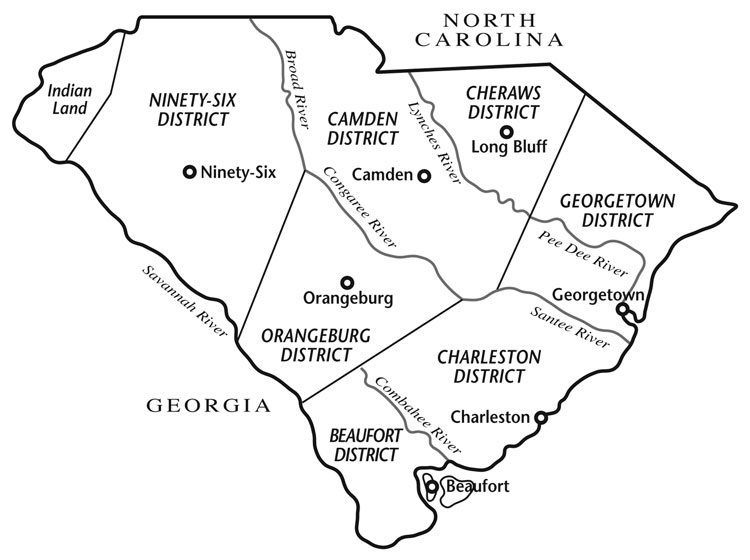
South Carolina Districts 1769-1784
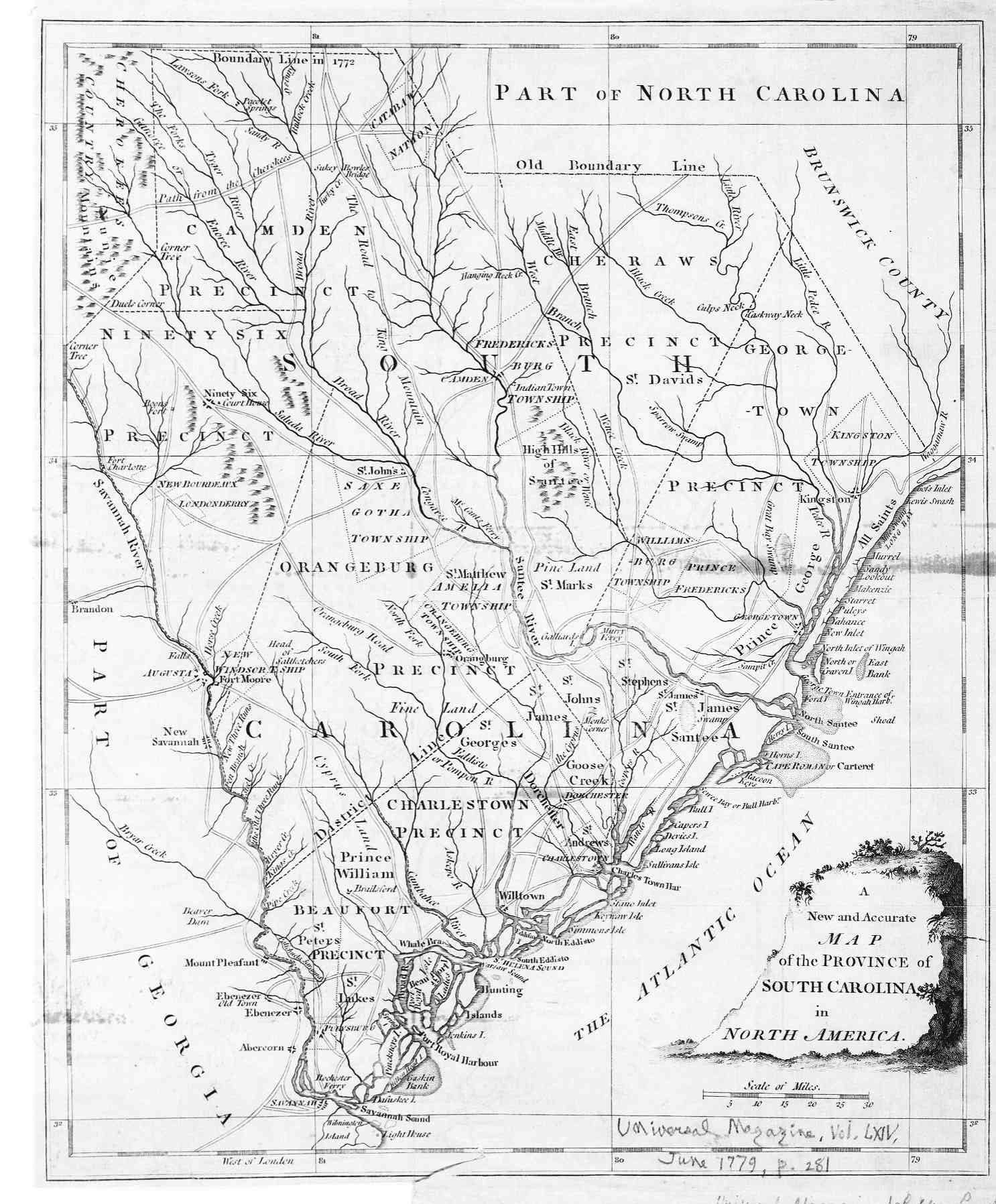
South Carolina Map 1779
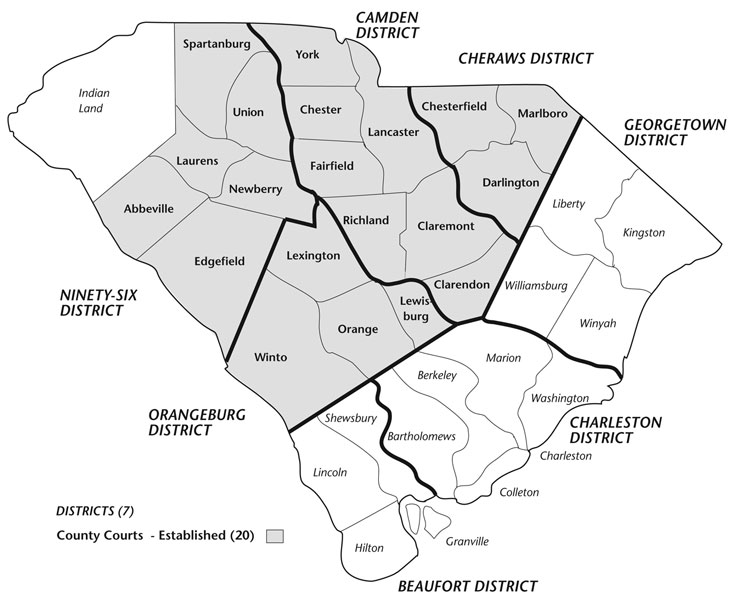
South Carolina Districts and Counties 1785
